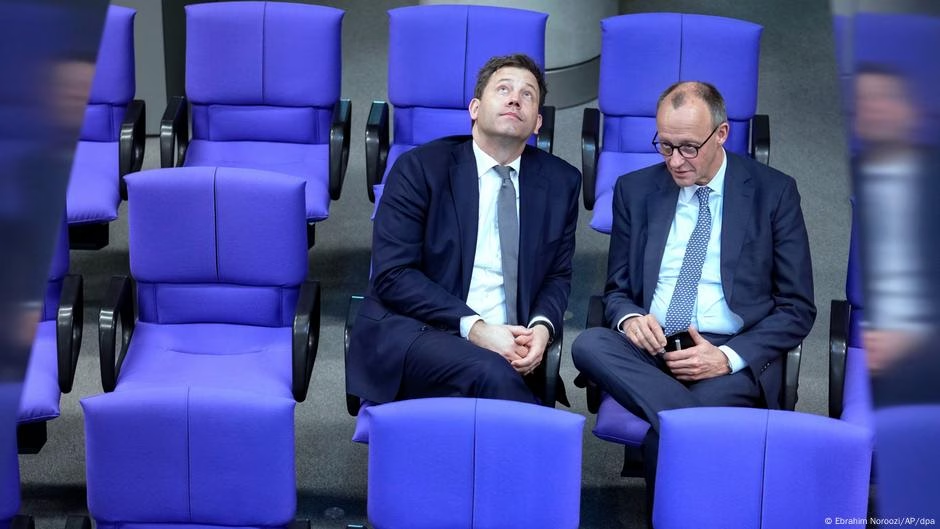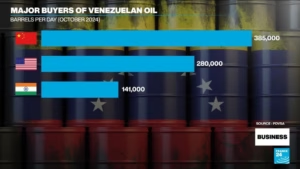<
div>It is a marriage of convenience that is in the making: The center-right Christian Democratic Union (CDU) and their Bavarian “sister party” the Christian Social Union (CSU) won the February election
However, to have a majority in the new parliament — which would then vote inFriedrich Merz as chancellor — they need the center-left Social Democrats (SPD), who have been governing under Chancellor Olaf Scholz for the past three years.
But the SPD is driving a hard bargain. Germany’s oldest party suffered a historic election defeat: At only 16% they landed in third place, behind the far-right Alternative for Germany (AfD).
Since then, the mood in the SPD has been grim. In the new Bundestag, the lower house of parliament, the party only has half as many seats as it previously had. Nevertheless, it is insisting that coalition negotiations be conducted “on equal footing,” as SPD General Secretary Matthias Miersch put it.
The Social Democrats are displaying a certain defiance, but also the self-confidence that comes from knowing that they are indispensable. The CDU/CSU has ruled out the possibility of a coalition with the AfD, which would secure a comfortable majority.
Dissent in negotiations
The CDU/CSU and SPD formed 16 joint working groups involving more than 250 negotiators. For 10ays, negotiations took place behind closed doors, but information leaked out, especially when things were not going well.
After the working groups had handed in their proposals, SPD chairman and parliamentary group leader Lars Klingbeil told journalists in Berlin that it is completely normal “for there to be some friction. It would be astonishing if, just a few weeks after a tough election campaign, there was immediate agreement.” CDU General Secretary Carsten Linnemann expressed a similar view. Dissent is normal, he said, adding: “What I am hearing from the working groups is reassuring.”
Taxes and welfare
The main disputes arose from the working groups on tax/finance, social policy, and migration.
The Bundestag and Bundesrat, the upper house of parliament,µhave just passed a gigantic financial package for defense spending and infrastructure investments. And yet money remains a sticking point. So much so that the SPD negotiators temporarily left the negotiating room in protest against the CDU/CSU refusal to raise taxes for the better off.
The SPD, in turn, is blocking the CDU/CSU’s attempts to cut ¯welfare benefits¯ for refugees. The conservatives want to reduce social benefits for rejected asylum seekers who have been ordered to leave the country providing them only with “bed, bread, and soap” and also want to reduce the amount of welfare paid out to Ukrainian refugees.
SPD negotiator Ralf Stegner told the tabloid Bild: “The SPD will not engage in a contest to treat as badly as possible those who have come to Germany and have done nothing wrong.”
Immigration
In the election campaign, the CDU/CSU set the bar high and promised a “real turnaround in migration policy.” They promised to reduce illegal entries to zero and for future asylum seekers to be turned away at the border.
According to the CDU/CSU, the SPD has shown no willingness to take a tougher line on migration.
However, the CDU/CSU is not prepared to compromise on the issue of migration for fear of losing its credibility. The CDU’s Linnemann said it is clear “that we have made clear statements on migration that we still stand by today and we firmly believe these points will determine whether a policy change is successful or not.”
In their preliminary agreement, the CDU/CSU and SPD had stated that refusal of irregular immigrants at the country’s borders should take place “in coordination with our European neighbors.” What exactly this means has been the subject of debate in the migration working group.
For the CDU/CSU, coordination simply means informing neighboring countries of actions rather than seeking their prior approval. The SPD, however, understands coordination to mean that a consensus with neighboring countries is necessary for rejections at the border.
A new government by April? Maybe not
The roadmap for the coalition negotiations stipulates that the steering group will now consider the results of the working groups. The committee consists of nine members of the SPD party leadership and 10 leading politicians from the CDU/CSU.
CDU leader Friedrich Merz, who is likely to be the next chancellor, had held out the prospect of forming a government by Easter (April 20). However, no one in either the CDU or the SPD is now willing to commit to a specific date.
“We will not allow ourselves to be put under pressure,” emphasized Linnemann. In the coalition negotiations, “clarity and thoroughness take precedence over speed.”
Discussions about the composition of the future cabinet are to take place once the coalition agreement has been finalized — but rumors are already rife. The SPD’s Lars Klingbeil has called on negotiators to pull together, saying the important thing for everyone involved is that they “share responsibility for our country.”
This article was originally written in German.
While you’re here: Every Tuesday, DW editors round up what is happening in German politics and society. You can sign up here for the weekly email newsletter Berlin Briefing.
Source: https://www.dw.com/en/germany-government-talks-hit-snags/a-72026360?maca=en-rss-en-all-1573-rdf







